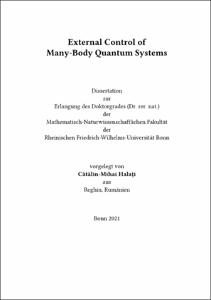Halaţi, Cătălin-Mihai: External Control of Many-Body Quantum Systems. - Bonn, 2021. - Dissertation, Rheinische Friedrich-Wilhelms-Universität Bonn.
Online-Ausgabe in bonndoc: https://nbn-resolving.org/urn:nbn:de:hbz:5-63855
Online-Ausgabe in bonndoc: https://nbn-resolving.org/urn:nbn:de:hbz:5-63855
@phdthesis{handle:20.500.11811/9343,
urn: https://nbn-resolving.org/urn:nbn:de:hbz:5-63855,
author = {{Cătălin-Mihai Halaţi}},
title = {External Control of Many-Body Quantum Systems},
school = {Rheinische Friedrich-Wilhelms-Universität Bonn},
year = 2021,
month = oct,
note = {In strongly correlated many-body quantum systems, the complex interplay between a large number of degrees of freedom and the presence of various competing energy scales leads to rich phase diagrams, but also renders these systems extremely susceptible to external perturbations. Engineering couplings to external fields, or environments, offers the possibility of controlling the behavior of these quantum systems. This has opened up the door for the preparation of quantum phases of matter and light with sought-after properties, both in ultracold atoms and solid state platforms.
This thesis explores two directions for externally controlling many-body quantum systems, aiming to steer systems towards non-trivial quantum phases, or to investigate complex quantum phase transitions. First, we consider ultracold bosonic atoms coupled to a dissipative optical cavity. The interplay between the kinetic motion, atomic short range interactions and the global coupling to the lossy cavity mode provides a perfect platform for the study of many-body aspects of the self-ordering processes. In this thesis, we present several methodological developments for atoms-cavity coupled systems, going beyond the usual mean field methods. These novel methods allow us to show the crucial role of the fluctuations in the atoms-cavity coupling, which give a mixed state character to the self-organization phase transition. Furthermore, we investigate the presence of a strong symmetry which leads to the existence of conservation laws and the coexistence of multiple steady states in the open system. We analyze the many-body dynamics after slightly breaking this symmetry. Additionally, we show that by engineering the coupling to a cavity we realize a dynamically induced spin-orbit coupling. We find that a Meissner superfluid steady state exhibiting a non-trivial chiral current can be stabilized in the coupled system. Secondly, we study the excitation spectrum of the one-dimensional XXZ spin chain with a position dependent magnetic field, across a magnetic quantum phase transition. We show that at high magnetic fields the dynamics of single magnons dominate the low-frequency excitations and that states of two confined magnons are present at large frequencies. Our results are in very good agreement with measurements performed on the BaCo2V2O8 compound in high magnetic fields.},
url = {https://hdl.handle.net/20.500.11811/9343}
}
urn: https://nbn-resolving.org/urn:nbn:de:hbz:5-63855,
author = {{Cătălin-Mihai Halaţi}},
title = {External Control of Many-Body Quantum Systems},
school = {Rheinische Friedrich-Wilhelms-Universität Bonn},
year = 2021,
month = oct,
note = {In strongly correlated many-body quantum systems, the complex interplay between a large number of degrees of freedom and the presence of various competing energy scales leads to rich phase diagrams, but also renders these systems extremely susceptible to external perturbations. Engineering couplings to external fields, or environments, offers the possibility of controlling the behavior of these quantum systems. This has opened up the door for the preparation of quantum phases of matter and light with sought-after properties, both in ultracold atoms and solid state platforms.
This thesis explores two directions for externally controlling many-body quantum systems, aiming to steer systems towards non-trivial quantum phases, or to investigate complex quantum phase transitions. First, we consider ultracold bosonic atoms coupled to a dissipative optical cavity. The interplay between the kinetic motion, atomic short range interactions and the global coupling to the lossy cavity mode provides a perfect platform for the study of many-body aspects of the self-ordering processes. In this thesis, we present several methodological developments for atoms-cavity coupled systems, going beyond the usual mean field methods. These novel methods allow us to show the crucial role of the fluctuations in the atoms-cavity coupling, which give a mixed state character to the self-organization phase transition. Furthermore, we investigate the presence of a strong symmetry which leads to the existence of conservation laws and the coexistence of multiple steady states in the open system. We analyze the many-body dynamics after slightly breaking this symmetry. Additionally, we show that by engineering the coupling to a cavity we realize a dynamically induced spin-orbit coupling. We find that a Meissner superfluid steady state exhibiting a non-trivial chiral current can be stabilized in the coupled system. Secondly, we study the excitation spectrum of the one-dimensional XXZ spin chain with a position dependent magnetic field, across a magnetic quantum phase transition. We show that at high magnetic fields the dynamics of single magnons dominate the low-frequency excitations and that states of two confined magnons are present at large frequencies. Our results are in very good agreement with measurements performed on the BaCo2V2O8 compound in high magnetic fields.},
url = {https://hdl.handle.net/20.500.11811/9343}
}






